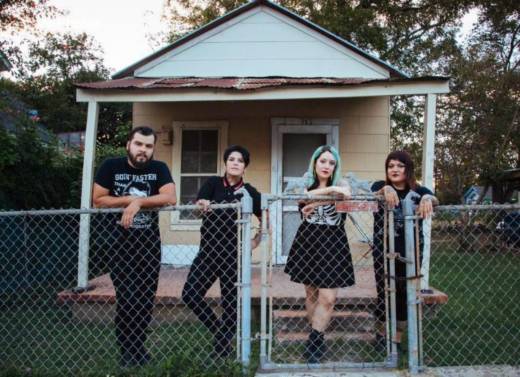With members of the punk rock group Girl in a Coma, the Chicanx riot grrl band FEA take on the stereotypes of Mexican women and “what they’re good for” in this bilingual pop-punk track. Lyrics like “Abre las piernas, eres sucia, eres perra [spread your legs, you’re filthy, you’re a dog]” are words one could imagine our commander-in-chief using against women or anyone who dares criticize him. In this song, however, it’s the women who have the last laugh.
Alice Bag – “Programmed”
The story of Alice Bag, Los Angeles’s first Chicana punk artist, is illuminated in her fist-to-the gut memoir Violence Girl, and it’s one of survival. Bag grew up in a physically abusive household, and recalls watching her mother being dragged in the street by her hair as she stood by, unable to enact change. Her music, writing, and career as an educator have made that change, and challenges misogyny/machismo and the belief that Chicanxs must stay in their place. “Programmed” confronts the notion that Chicanx/Mexican contributions were only an anecdote in history, instead, her work proclaims: we are history.
Prayers – “Gothic Summer”
The Latinx community still experiences racial profiling and bears the brunt of criminalization efforts against gang members. In this hellscape, Prayers appears, with lead singer Rafael Reyes offering no apologies for his past experiences in San Diego barrios. Instead, songs like “Gothic Summer” are dedicated to those who have fallen, lost their lives to gun violence, are viewed as sinners, and for them, he asks, “Santa Muerte, won’t you sanctify my name?”
Ausencia – “Mi Lugar en Esta Mundo”
Los Angeles’s Ausencia is a band creating anti-fascist Oi punk that you equally want to thrash and skank to. Known for their political protests, like their performance in solidarity with union workers and those organizing for higher wages on May Day, Ausencia doesn’t just sing about struggle, they live it. “Mi Lugar en Esta Mundo” describes the conflict Mexican Americans and Chicanos experience with not feeling welcome in the United States, yet not being able to dream of a way out.
Downtown Boys – “100% Inheritance Tax”
When Victoria Ruiz performed recently with the Downtown Boys at the Night Light in Oakland, she screamed, “Let’s tax those who inherit their privilege 100 percent!” before blazing across the stage, jumping into the audience, and having the crowd sing along to her anti-capitalist manifesto. As President Trump continues to withhold his tax returns and proposes tax cuts for the rich, the reasoning behind an inheritance tax couldn’t be clearer. With its aggressive saxophone, dripping bass, and call-to-arms lyrics, the message seems crystal-clear: resist a tax system that only benefits the 1 percent.
Generacion Suicida – “Criminal”
The dark-wave-meets-post-punk South L.A. group Generacion Suicida deliver a smooth ’70s sound that’s a far cry from the Southern California hardcore aesthetic. “Criminal” discusses the war against the working poor, homeless, and migrant populations of Los Angeles: “Necesitas sobrevivir /en un sistema no hecho para ti /sin trabajo, sin dinero /no hay ningun otro remedio [You need to survive/ a system not designed for you/ without work, without money/ there is no other solution].” Generacion Suicida confronts such black-and-white thinking and makes listeners consider, ‘Why are we blaming the poor for being poor?’
Felipe Botello y El Sonoro Rugir – “Nuestras Hijas de Regreso”
In the border town of Juárez, in the Mexican state of Chihuahua, beautiful murals of the thousands of “disappeared” girls and women line the town with altars and fresh flower offerings. Often, the dates these women were last seen accompany the mural with a plea: Vivas las queremos, vivas nos queremos [You want them [found] alive, we want [the right] to live]. The Mexico City band Felipe Botello y El Sonoro Rugir dedicated “Nuestras Hijas de Regreso” to the missing women of Juárez, and in this norteño-meets-alternative rock ballad, the band calls out the injustice of living in a society where the murder of women is met with indifference and impunity.
Maldita Vecindad – “Sur del Sur”
Early pioneers of rock en tu idioma in the late ’80s, Maldita Vecindad has been composing ska-rock corridos with Afro-Caribbean beats and politically charged lyrics for the past 30 years. Formed in the wake of the 1985 Mexico City earthquake, the band deeply identifies with the punks, working poor, and condenados who led the charge in aiding victims of the quake, helping find bodies, and rebuilding the city. “Sur del Sur” is an anthem for immigrants to fight for their rights — a response to those who would dare to call us ‘illegal.’ “Yo no crucé la frontera/ La frontera me cruzó a mí [I never crossed the border/ The border crossed me].”



